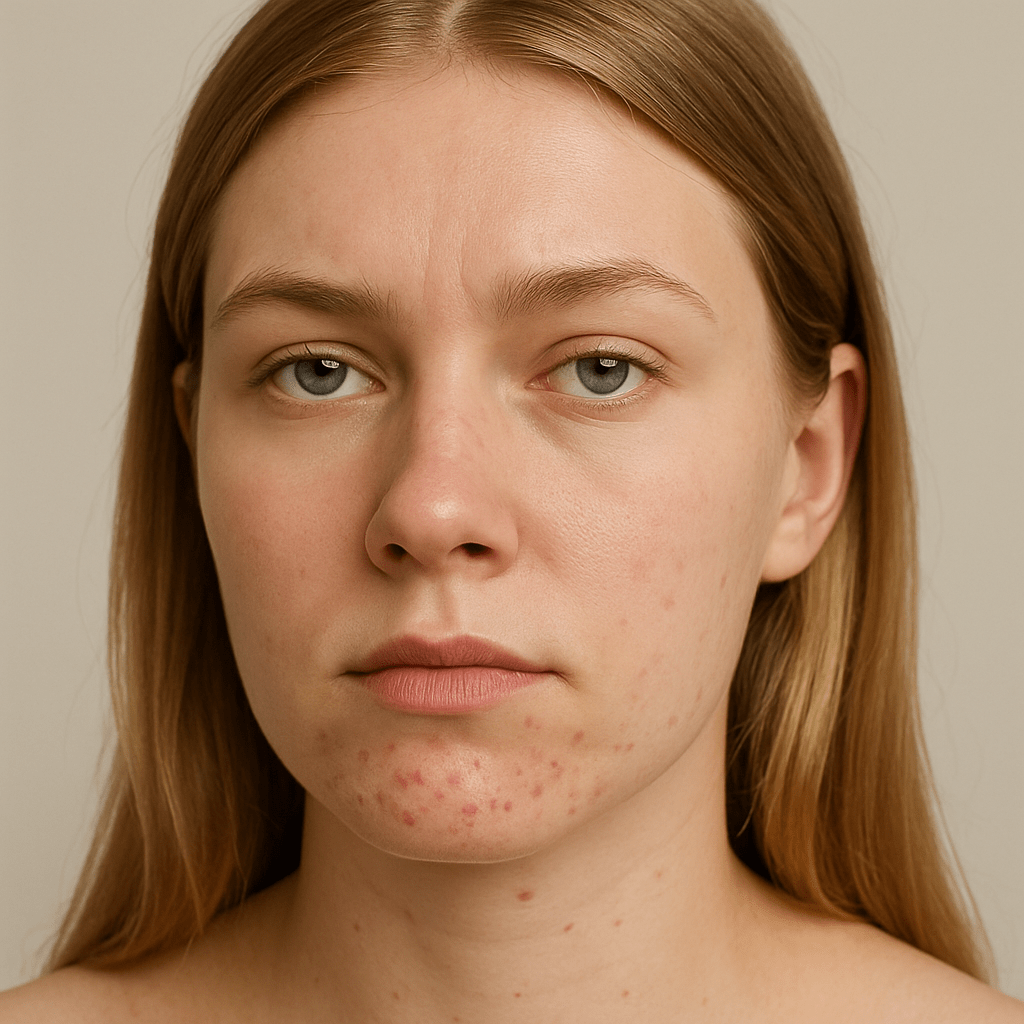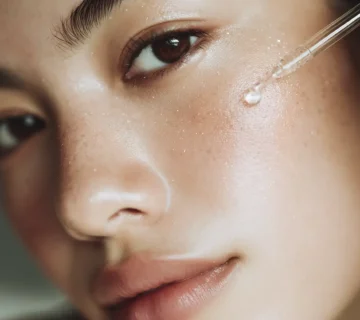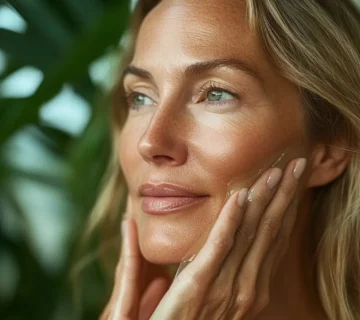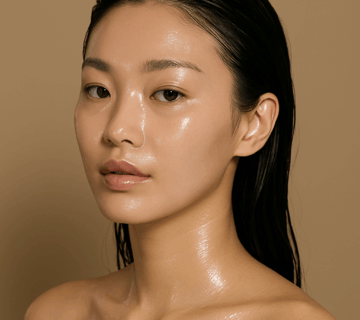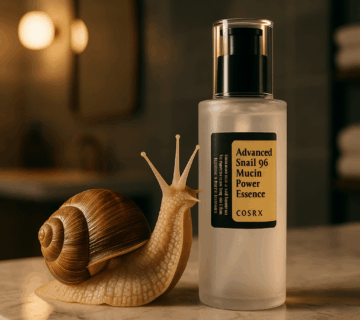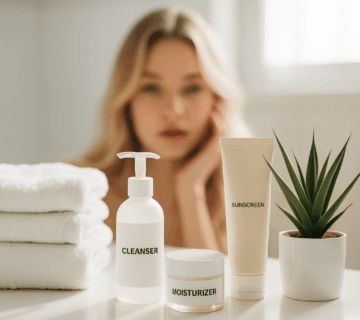Waking up to find yet another pimple planted squarely on your chin isn’t just annoying. It’s deeply frustrating, especially when it seems to happen like clockwork. Whether you’ve been battling chin acne since your teen years or it’s a new issue that cropped up in adulthood, you’re not alone. They often show up in the same exact spot, just as you’re finally starting to see some improvement.
The truth is, acne around the chin and jaw isn’t just about surface-level skin issues. There’s a lot happening beneath the surface; hormonal shifts, clogged pores, lifestyle habits, and even your skincare routine can all be part of the puzzle. If you’ve been asking yourself, “What causes chin acne and why does it keep coming back?”
Why Does Chin Acne Happen?
Chin acne doesn’t just appear out of thin air. It’s typically a result of multiple factors working together. One big player? Hormones. Another? Clogged pores on the chin that trap oil, dead skin, and bacteria. And then there are the subtle daily habits; like not removing your makeup completely or mindlessly touching your face that can make things worse.
Whiteheads on the chin are especially common in this area because the skin tends to be a bit thicker and oilier than other parts of the face. Add in hormonal changes and poor product choices, and you’ve got a recipe for recurring breakouts.
The Role of Hormones in Acne Around Chin and Jaw
If you notice acne popping up around your period, during high-stress weeks, or as part of a larger hormonal shift (like going off birth control or entering perimenopause), there’s a good chance hormones are the trigger.
Here’s how it works: fluctuations in androgens (male hormones that both men and women produce) can increase oil production. That excess oil, or sebum, gets trapped in your pores and forms those inflamed bumps or whiteheads you see along your jawline and chin.
This type of acne is often deeper, more painful, and slower to heal. It’s also more likely to come back again and again in the same spots. Sound familiar?
Common hormone-related chin acne triggers:
- Menstrual cycle fluctuations
- Puberty
- Pregnancy or postpartum shifts
- Stopping or starting hormonal birth control
- Chronic stress or lack of sleep
Clogged Pores on Chin: A Hidden Culprit
Even if hormones are the initial spark, clogged pores on the chin are usually what allows acne to flourish. Dirt, sweat, makeup, and dead skin cells all mix with sebum (your skin’s natural oil) and get trapped in pores; leading to whiteheads, blackheads, or painful pimples.
Some of the sneakiest contributors to clogged pores include:
- Not washing your face thoroughly after sweating
- Sleeping with makeup on
- Using pore-clogging products (even “natural” ones!)
- Wearing tight masks (hello, maskne!) or chin straps
Ever notice breakouts on your chin after a long day of wearing a face mask or sweating at the gym? That’s the result of heat, friction, and trapped bacteria creating the perfect environment for acne to thrive.
How Lifestyle Habits Influence Breakouts on Chin
Even with flawless skincare, lifestyle choices can still sabotage your efforts. Your skin is a mirror of what’s happening inside your body, and chin acne is often the reflection of everyday habits.
Let’s look at some common lifestyle-related triggers:
Touching your face: It’s easy to do without thinking. Resting your chin in your hand while scrolling, picking at bumps, or wiping sweat. All of this introduces bacteria and oil directly onto your skin.
Diet: Sugary snacks, dairy, and processed carbs may increase inflammation or insulin levels, which in turn can trigger more oil production. Some people report a spike in whiteheads on the chin after indulging in chocolate or cheese-heavy meals.
Stress: Chronic stress raises cortisol, which disrupts your hormonal balance and leads to acne around the chin and jaw.
Lack of sleep: Your skin does most of its repair work while you sleep. Skimping on rest throws off your hormone balance and slows healing.
Skin and Cosmetic Products That Can Cause Chin Acne
Ironically, some of the products meant to help your skin might be making it worse. Thick moisturizers, pore-clogging makeup, or even your toothpaste can lead to acne flare-ups. Especially on the lower half of your face.
Watch out for these common pore-clogging culprits:
- Mineral oil
- Lanolin
- Isopropyl myristate
- Coconut oil (in some acne-prone individuals)
Your toothpaste can also be a silent contributor. Particularly if you notice breakouts right around the mouth and chin. Foaming agents and fluoride can irritate sensitive skin.
Pro Tip: Always check that your skincare and makeup are labeled “non-comedogenic” this means they’re less likely to clog pores.
How to Manage Whiteheads on Chin Effectively
Whiteheads are a milder form of acne, but they can still be frustrating. Luckily, they’re also more responsive to simple, consistent skincare routines.
Here’s a gentle game plan:
- Cleanse twice daily with a mild, non-stripping cleanser.
- Exfoliate gently using salicylic acid or an enzyme-based product 2–3 times a week.
- Use spot treatments with benzoyl peroxide or sulfur on problem areas.
- Avoid popping or picking, which can spread bacteria and cause scars.
Now, let’s talk solutions.
Why Korean Skincare Is a Smart Solution for Chin Acne
Korean skincare (also known as K-beauty) focuses on healing, hydrating, and protecting the skin barrier. Making it an ideal choice for managing and preventing chin acne.
Top K-beauty tips for acne-prone skin:
- Double cleanse using an oil cleanser followed by a water-based cleanser to thoroughly remove makeup and sunscreen.
- Use a low-pH cleanser like Cosrx Low pH Good Morning Gel Cleanser to maintain skin balance.
- Try a toner with BHA (salicylic acid) to unclog pores and reduce whiteheads.
- Apply lightweight, soothing serums with centella asiatica or snail mucin to calm irritation.
- Finish with a gel-based, non-comedogenic moisturizer to hydrate without clogging.
Korean skincare isn’t about harsh scrubs or drying out your skin. It’s about consistent, gentle care that leads to long-term results.
Prevention Tips for Chin Acne You Can Start Today
Preventing chin acne is often more about what you stop doing than what you start.
- Hands off your face, really. Keep them clean and away from your chin.
- Clean your pillowcases and phone screen weekly.
- Remove makeup completely before bed.
- Incorporate Korean skincare principles: double cleanse, layer hydrating toners and use gentle actives.
- Eat a balanced diet rich in vegetables, healthy fats, and water.
- Manage stress with daily rituals like meditation, yoga, or deep breathing.
- Protect your skin with sunscreen daily, even on cloudy days.
A small shift in your daily routine can lead to big changes in your skin over time.
Chin Acne
Chin acne is more than just a surface issue. It can chip away at your confidence and leave you feeling frustrated. But once you understand what’s triggering your breakouts; from hormonal imbalances to clogged pores and stress—you can take real, lasting steps to heal.
Be patient with your skin. It’s not about perfection but it’s about progress. With the right habits, gentle skincare, and maybe a few lifestyle tweaks, you can get back to feeling good in your skin.
FAQs
Recurring chin acne is often caused by hormonal fluctuations, especially in women, and made worse by clogged pores, stress, or irritating skincare products.
Yes, whiteheads are non-inflammatory clogged pores, while pimples tend to be red, swollen, and inflamed due to bacteria or trapped oil.
Absolutely. Sugary and dairy-rich diets can contribute to hormonal imbalances and inflammation, both of which can worsen acne around the chin and jawline.
Yes! Touching your face introduces bacteria and oils that clog pores. Especially around your chin and jaw where acne tends to be most stubborn.
Yes. Prolonged mask-wearing traps moisture and bacteria, which can lead to friction and breakouts a phenomenon now known as “maskne.”
If your acne is painful, cystic, scarring, or unresponsive to home care after a few months, it’s time to seek professional advice.


